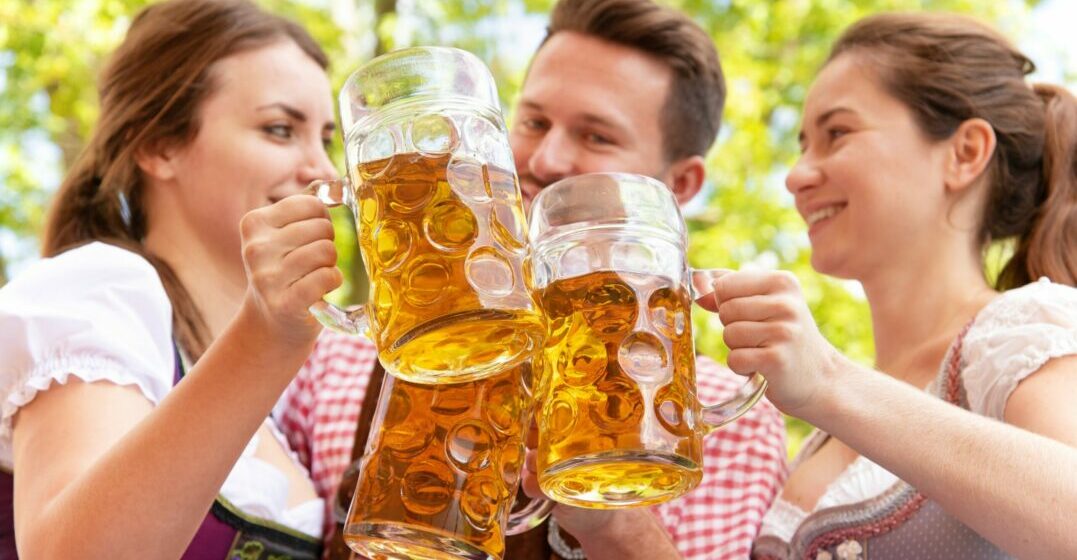by Laura Jones
Updated on January 9, 2024
Do all Austrian people wear Lederhosen, live in the mountains and ski to work as Austrian stereotypes would have us believe? And what about a love of classical music and apple strudel? Let’s try to sort the myth from the fact and uncover whether any of these eight Austrian stereotypes are true.
Walk down any street in Vienna and you’ll see… very few people wearing the traditional Lederhosen or Dirndl. The men’s Lederhosen – leather shorts with braces – and women’s Dirndl – a wide skirt with a close-fitting bodice – are worn during folk festivals and special occasions like the Wiener Wiesn Fest – Vienna’s answer to Oktoberfest. You might also see shopkeepers wearing them, often to attract tourists. Day to day, Austrian people dress just like everyone else in Europe.
Many people assume that all Austrians adore classical music and spend their time waltzing in ballrooms in elaborate dresses and suits. This stereotype sprang from Vienna’s central role in classical music in the 18th and 19th centuries, when it was home to composers including Mozart, Beethoven and Strauss. And from the famous Viennese waltz, a dance craze that took over in the 19th century and that makes the “Macarena” look positively unknown.
And while Vienna is still a center for classical music and around 10,000 people listen to live classical music there every evening, ordinary Austrians have diverse musical tastes. Including the “Macarena”.
Think of Austrian food and the first thing that likely springs to mind is apple strudel (Apfelstrudel). Or perhaps a big slab of schnitzel with potatoes on the side. Or maybe even the rich, chocolatey Sachertorte. And it’s true that you can find these Austrian dishes all over the country and they’re some of the country’s most popular traditional foods.
But, it’s not all meat, potatoes and heavy desserts. About 10% of the Austrian population are vegetarian or vegan, and it’s easy to find options to fit these diets throughout the country. And, thanks to its diverse population, you can find just about any world cuisine, at least in larger cities.
The Austrian tradition of swigging from a large stein of beer while wearing Lederhosen is a popular stereotype. And Austria certainly does have some good beer, like Stiegl and Gösser, and lovely beer gardens to spend summer afternoons and evenings in.
But, there’s far more than just beer in the country. If you prefer wine, there are excellent wineries that produce varieties like Riesling and Veltliner. However, Austria’s so-called national drink is not alcoholic at all. Almdudler is a fizzy soft drink made with herbal extracts. Definitely one to try if you visit Austria!
Thanks to films and TV, you might think that all Austrians live in charming wooden chalets in the mountains and skip to work through a meadow of edelweiss. As beautiful as that image is, it’s just not real. About two-thirds of Austrians live in cities, especially the capital Vienna, and many people in the city centers live in apartments rather than houses or cottages. Gorgeous mountain chalets do exist of course, but they’re more likely to be holiday homes.
Even if they don’t live in the mountains, all Austrians can ski, right? Well, maybe not all Austrians but skiing and other winter sports are unsurprisingly popular in the country. Austria has excellent ski runs and they’re often cheaper than in Switzerland or France so it’s a great place to try out your skills. Just mind out for the three-year-old zipping past as you flail about trying to get your skis to point in the same direction.
This is a big no. There are of course similarities between the countries, as there are between most European countries, but Germany and Austria are distinctly separate nations with their own governments, culture and traditions.
Even their languages are slightly different and while most Austrians learn standard German and can speak to their German counterparts, they also speak Austrian German, which has some distinct vocabulary. Those potatoes you want to order are Erdäpfel in Austria, not Kartoffeln like in German, and the whipped cream for your Sachertorte is Schlagobers not Schlagsahne.
One of the things that Austrians are known for and does make them similar to Germans, is their love of punctuality. If you’re thinking about the dos and don’ts in Austria, one would definitely be: Don’t be late! In business especially, even a short delay can be offensive and you should try to be five minutes early to any important appointments. You’ve been warned!
The best way to find out whether all Austrian women are wandering around in Dirndl or if everyone waltzes through the streets humming Beethoven is to visit Austria. Some advice before you go – arrive on time, learn a bit of Austrian German and save your Lederhosen for Wiener Wiesn Fest.
